Genre: Strategy Developer: Sensible Software Publisher: Virgin Games Players: 1-2 Released: 1992
Tyrants: Fight Through Time a real-time strategy game, where you get to be God. Much like Populous before it, you, control the destiny of a poor group of woeful humans, who have no idea they are just pawns in an epic death match between deities. This is the kind of game I can really get into, where I can raise an army of a few hundred humans, lightly or heavily arm them, and send them off like sheep to fight my battles for me. If they die, what do I care? I’m a God, what are they going do about it? If they win, then good job men, now get back to that deep pit mine and work!
Ok, so I like this game a bit too much perhaps, but it’s one of those little gems that nobody talks about when discussing the best games on the Genesis, and I feel that if anything, this is the best example of an RTS to be found on the machine, among games like Power Monger, Populous, and Centurion: Defender of Rome. Tyrants is the truest form of the genre, incorporating all the basic features and gameplay elements that über-successful games like Command & Conquer and Starcraft would incorporate. Things like constructing buildings, designing weapons, increasing technology levels, and of course raising an army.
Graphically, it does not impress. The best looking material appears on the title screen, and the in-game graphics originally led me to believe that this was another Amiga game ported to the Genesis, but I have yet to find proof that this game exists on any platform other than this one. Sensible Software, the developers of Tyrants, also produced a game titled Cannon Fodder, and the graphics of the two games are very similar. Everything is miniaturized, and it can be hard to make out differences in army units sometimes. The avatars of the various gods in the game appear at the top of the screen and are very big and full of color, but unfortunately, a lot of that color didn’t end up on the field of play. You see, the game is played on an island, broken up into various amounts of sectors. Each sector looks virtually identical, with only very minor differences to the terrain, but no difference in color. The field of play tends to be littered with too much green, brown and tan. It works though, and at least it’s not hard on the eyes.
Not everything is depressing about the game graphics. There is some detail applied once you get a few epochs into the game. The weapons start getting bigger and it becomes more obvious what your army is using. It can be quite comical also to see those miniature humans wheeling around a catapult or a cannon, fighting against a defending force of archers. Or to see a defender pour a hot cauldron of oil all over some poor sap who gave his life for me. The avatars of the gods have some simple animations as well. They blink their eyes and will also move their lips when talking, which unbelievably, sounds crystal clear.
The description on the back of the box to Tyrants states: four megabits of digitized speech. I don’t really know the scope of what that means, but there is quite a bit of actual voice speech on this cartridge, and it’s all easily recognizable with minimal distortion. Each god has a different voice with a different accent, and with differing degrees of sarcasm and/or rudeness. The gods speak when asked by you for an alliance, or when they ask you for an alliance. There are various sentences spoken throughout the game when tasks are completed as well, not by the gods, but by the designers working for you. For example you can hear a German-sounding designer state that the design is finished, or an American say you’re running out of elements. I particularly like the rude comments by the gods. Ask one for an alliance, and you may be greeted with a sharp reply: “Ha! No! “The rest of the audio in the game is forgettable and annoying. Thankfully you can turn the music off, as it is the most annoying drum-beat you’ve ever heard, and it never changes! I don’t care for any of the sound effects either. The weapons, the sound of construction, all of it is very poor and simple.
Gameplay is the reason this game is a winner. If you are familiar with modern RTS games, you will feel comfortable playing Tyrants. The game is separated into 9 epochs (levels), and each epoch has three islands (battlefields) to play through. Controls are basically point and click, as you simply designate how many men to do each task you want. Whether its constructing a building, mining elements, or designing a weapon, all you do is raise or lower the amount of men doing each of these things. The army is the same way, you simply designate how many men you want in it, and what weaponry they carry, and then point to which sector to send them off to kill people. You cannot micro manage the army; it works all on its own once its set in motion. All you can do is either reinforce it or retreat.
You have a pool of a hundred men per epoch to divide up between the three islands. Thusly, strategy begins before you even play the game, as you must decide how many men you can win with. Any men you don’t use are carried over to the next epoch, so the game has you thinking ahead right at the beginning. Starting out in 9500 B.C. as cavemen, you can only collect elements by hand, and are limited to designing simple weapons like a rock, or a stick. I find it comical that you can design a ‘rock’ weapon when the only element you have is Wood. Or how about a stick weapon with stones? The game progresses slowly, which is good because it doesn’t get too hard too fast. Each sequential epoch is one tech level ahead of the last. As you design weapons, you’ll increase your tech level of the current sector, which reduces the design time for everything. Basically, this is how you win. If you can keep ahead of the other gods in technology, you will be victorious as you annihilate his puny catapult army with your superior air force.
This is generally how the game progresses throughout. There is one major change to the gameplay by about the fourth epoch, and that is when you must start building a factory to build your designed weapons. At a certain tech level, all the weapons need to start being produced in the factory before you can use them, which kind of slows the game down a bit, as it’s one extra step required. Fortunately you can adjust the speed of the game. At the 1945 A.D. tech level, I found the game really starts to fizzle out, as all you do is design nuclear weapons as fast as you can, because this is what the enemy is doing. Basically, the first person to develop nukes wins. The only thing that stops nukes are S.D.I. lasers, which are a defense-only weapon. However, nukes can be designed faster than the space-age S.D.I. weapon because nukes are a lower tech level. Do the math. Of course, you can stall and goof around building space ships and S.D.I. just for fun, but if you want to win quick, nuke bombs are the way to go.
Overall, there’s enough here to satisfy an RTS fan. It’s a lot of fun to be god, and you’ll have a lot of fun advancing through the ages of human history, creating your own epic battles, and eventually, nuclear holocaust. It could have scored higher for me if Sensible would have put more effort into the graphics and music effects.
SCORE: 7 out of 10


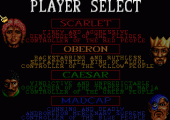
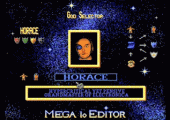
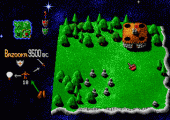
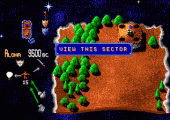
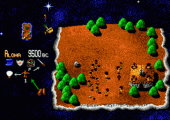
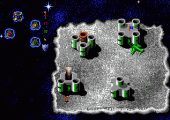
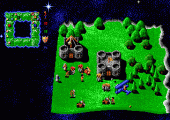
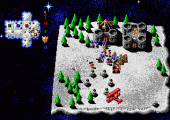
Recent Comments